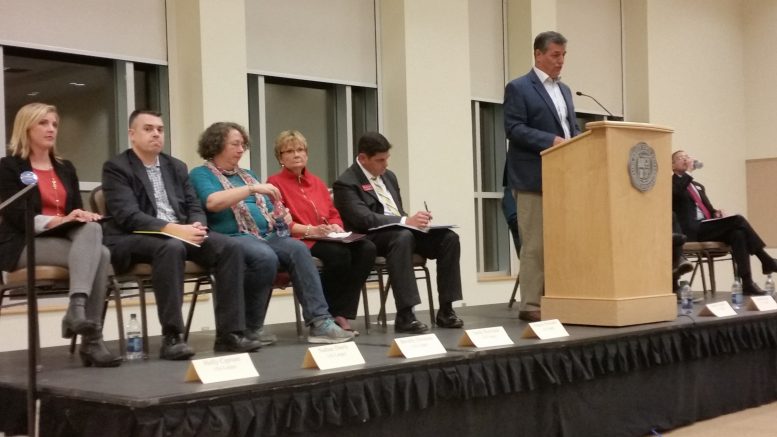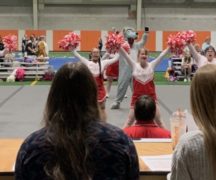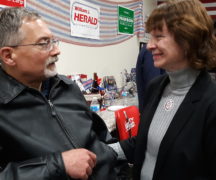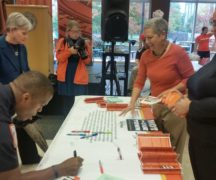By JAN LARSON McLAUGHLIN
BG Independent News
Bowling Green City Council candidates wooed student voters Monday evening with promises to work on decent housing, better job opportunities and more renewable energy.
Ten of the 13 candidates running for City Council spent two hours answering questions during a forum at Bowling Green State University. Third Ward candidate Mike Aspacher is running unopposed, so was present but did not participate. At-large candidate Carolyn Kawecka and Second Ward candidate Kent Ramsey were no-shows.
The candidates were asked about three local topics by the moderators – rental housing, environmental safety, and the city-university relationship.
They were asked how the city could hold landlords more accountable for the condition of rental properties. The question specifically referenced the “power over the city” held by landlords like the Newlove, Maurer and Green families.
William Herald (Republican for Fourth Ward) said efforts have been made by the city to improve housing through such proposals as the master plan update. The city has worked on improving the appearance of neighborhoods, but “those efforts need to be continued,” he said.
Scott Seeliger (Democrat for Fourth Ward) agreed that housing is a problem. “We certainly have an issue in housing.” He suggested that zoning changes would be the best way to make improvements. “We have to work with the owners. We have to work with the students.”
John Zanfardino (Democrat for Second Ward) said the current programs in place for correcting substandard housing are insufficient. “I have grave concerns about the rental properties in Bowling Green.” Other communities, like Oxford, require that landlords have rental properties inspected prior to leasing. “You know that’s not happening here,” he said. “We kick the can down the road on this issue. We need to start hearing from students.”
Hunter Sluss (Republican for First Ward) said his hometown of Sandusky hands out “pride awards” for homeowners that take care of their properties. The city also offers grants to help owners remodel homes. Such programs could help local landlords re-evaluate their properties, he said.
Daniel Gordon (Democrat for First Ward) noted this is an ongoing issue. “We don’t like asking tough questions of ourselves.” There is a need to revitalize neighborhoods and improve housing stocks, and Gordon said he is working on drafting a plan that would make property owners more accountable. He asked the students to go to the city website to comment on the new Community Action Plan. “You need to chime in,” he said.
Gregory Robinette (Republican for At-Large seat) agreed, “It’s important that everyone has access to safe housing.” He pointed out that several programs are already in place to help meet housing standards, such as code enforcement through the planning office, the recently published “Good Neighbor Guide,” the building code and inspections by the Wood County Health District. Those programs may need to be better advertised to residents, so they are aware of their options, he said.
Sandy Rowland (Democrat for At-Large seat) explained that as a Realtor, she has seen first-hand some of the housing issues. “I have long had concerns about the housing stock in Bowling Green.” She has seen garages used for housing, and space heaters as the only source of warmth in homes. “We need safety inspections at the very least,” Rowland said, asking the students to speak up so the city realizes the seriousness. “We need your help as students.” She also spoke about the need for more housing designed for graduate students and married students.
Beverly Keeling Elwazani (Green Party for At-Large seat) said she has become more aware of housing issues while going door-to-door for her campaigning. “I’ve been on a lot of porches, and some are really scary,” she said. With at least 60 percent of the city’s housing being rentals, Elwazani said a licensing program would be a good idea. “There’s no reason someone should live in substandard housing. It’s a matter of social justice.”
Nathan Eberly (Independent for At-Large seat) pointed out the programs already in place and mentioned the Community Action Plan. But he agreed, “We do have an issue,” he said, talking from personal experience as a renter in the past. “We need to empower the renters.” But Eberly suggested private market solutions that could help solve the problem without adding more regulations, which can be slow to accomplish.
Holly Cipriani (Democrat for At-Large seat) also recounted her experience in the past living in substandard rental properties. “I do think it’s important to have protections put in place,” she said. The problem goes beyond the exterior of the properties, Cipriani added. “It’s not just about keeping up the appearance of the neighborhood,” it’s about protecting safety of renters, she said.
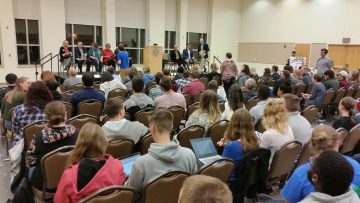
BGSU forum for city council candidates
The candidates were also asked to define their stands on the proposed anti-pipeline charter amendment on the ballot, and explain their efforts to protect the city’s air and water.
Cipriani said that while she supports the effort of the charter amendment to protect the environment, she cannot vote in favor of it. “I have read the amendment. I have read the charter,” and the two don’t belong together, she said. A better option may be to look at legislation aimed at protecting the city’s water and air.
Eberly noted that 40 percent of Bowling Green’s energy already comes from sustainable sources. He hopes the city can keep building on that, and he favors a quick permitting process for projects such as more solar power. As for the charter amendment, Eberly said the wording violates freedom of speech and personal property rights. “I’m adamantly opposed” to it, he said.
Elwazani said the wording of the charter amendment promotes “lawlessness.” “I can’t support the amendment as it’s written.” She would like to see the city work on some other type of effort to limit fossil fuels. “We have to protect what we have,” Elwazani said.
Rowland pointed out that Bowling Green’s water has an “outstanding” rating by the Ohio EPA, and the city has the largest solar field in the state. Efforts are underway to build another solar field, working with Wood County, she added. “That’s how we’re taking care of our air and water quality,” she said. Though she appreciates the efforts of the group behind the charter amendment, Rowland said she cannot support the poorly worded proposal.
Robinette noted Bowling Green’s success with renewable energy sources. “The city’s doing a dog-gone good job,” he said. “We need to continue the work the city is already doing.” Robinette said efforts must also continue regionally on the issue of algal blooms in Lake Erie and the Maumee River. As for the charter amendment, the candidate said he is glad the issue was approved to appear on the ballot, so city voters can defeat it. “It’s unconstitutional and has no place in our charter.”
Gordon said the city is working to make sure there is strict oversight of the Nexus pipeline construction, and he plans to work on an ordinance protecting the city if re-elected. But he does not back the charter amendment. “There is some problem language in it, that frankly, I can’t support.” Gordon said he is proud of the city for getting 40 percent of its power from renewable sources. “That’s huge for a small town,” he said.
Sluss said he has read the charter amendment, which does not seem to focus on the city’s clean water and air. “I personally don’t believe we should be voting for it.”
Zanfardino said the portion of renewable energy used by the city is actually 44 percent – making it second only to Oberlin in the state. “We have a lot to be proud of,” he said. As for the charter amendment, Zanfardino was the only candidate to support it. He agreed it may be flawed, but so are the pipeline permitting regulations. “The process is incredibly flawed.”
Seeliger said the proposed charter amendment does not belong in the city charter, which is reserved for governmental procedures. “The charter amendment is in the wrong place, with the wrong wording,” he said. Seeliger also spoke of the city’s water and solar efforts. “We’re very proud of the quality of water we have.” But he added that the city should always be looking for ways to improve. “We need to be vigilant.”
Herald also talked of the city’s strong efforts to increase its use of renewable power. As for the charter, he commended the citizens group for its proposal. “These groups with their interests make the city stronger.” Herald said he really wanted to support the amendment, “but the wording got in the way.”
The candidates were also asked about their plans to better integrate the city and university.
Robinette said the best way may be for the students to elect a fellow student to city council. He said council members should reach out to the university to keep nurturing relationships and engaging students.
Rowland stressed the importance of BGSU students in the community. “I think the students need to be empowered,” she said. “This is your community. You are our bread and butter.” She suggested more group meetings between city council and students may be a good idea.
Elwazani said Bowling Green full-time residents need to remember that while BGSU students may be adults, they are very young adults. “I think it’s important to be a nurturing community,” to help the students grow into responsible adults, she said. More efforts could be made for the city and students to work together on charity projects or celebrations in the community.
Eberly said the city needs the students. “With half the population being students, this is very important,” he said. Eberly suggested the city should engage students in adding excitement and events to the downtown. “We need to see the campus come downtown,” he said.
Cipriani pointed out her efforts as a former student to create a “shop local” campaign for the downtown. She stressed the importance of the service learning options in the community. “This is something I’m very passionate about,” Cipriani said. “You guys are a wealth of knowledge.”
Herald noted the mayor’s strong relationship with BGSU, and said it might be a good idea for students to elect a person who graduated from the university, lived in the residence halls, and then went on to teach there – speaking of himself. “That type of background might be beneficial in improving city-university relations,” he said.
Seeliger talked about the importance of the city investing in the East Wooster Street corridor, which as an eyesore is not good for the university. “This is not going to be an inviting campus,” without those improvements, he said. “We need each other.” Seeliger said council needs to be accessible to students. “We have got to listen to you.”
Zanfardino suggested that since students represent 60 percent of the city’s population, they should speak up. “Council members respond to who they hear from,” he said. “I don’t hear from students very much.” He also talked about his efforts to improve housing on the East Side of the city, near campus. “I watch it deteriorate,” and want to change that trend.
Sluss said as a student, he would be an ideal link between the city and university. “The city would basically not be here without us,” and vice versa, he said. He suggested working on more opportunities for internships and business partnerships between the community and students.
Gordon noted that he was first elected to council as a BGSU student. “I think we made a lot of progress,” he said. One of Gordon’s goals is to add jobs with living wages to the Bowling Green community, which would benefit students after they earn their degrees. “I want to make sure you actually have a reason to stay in Bowling Green after you graduate.”
The candidate forum was sponsored by BGSU Votes, BG Falcon Media, and Undergraduate Student Government.

